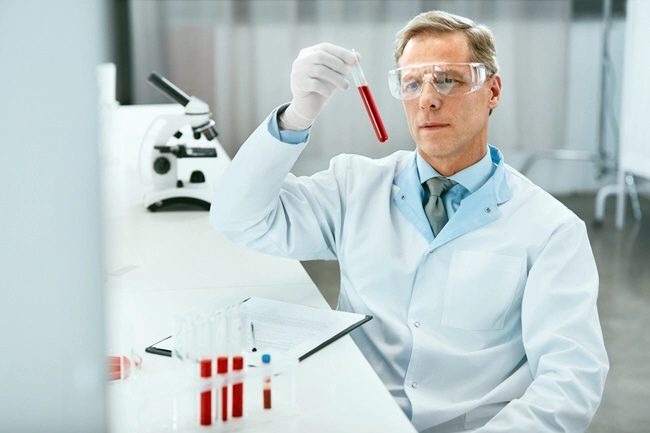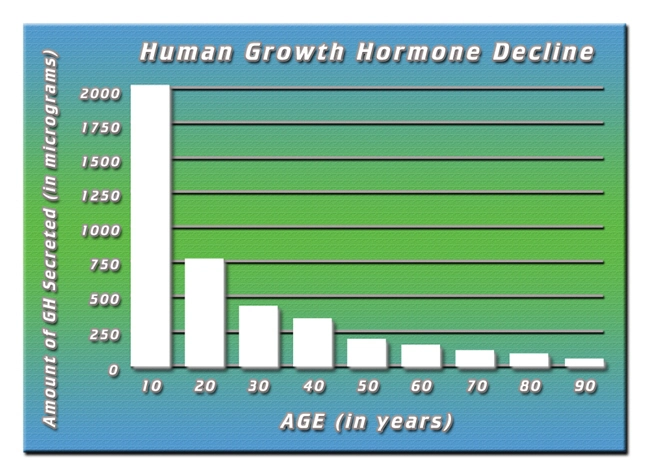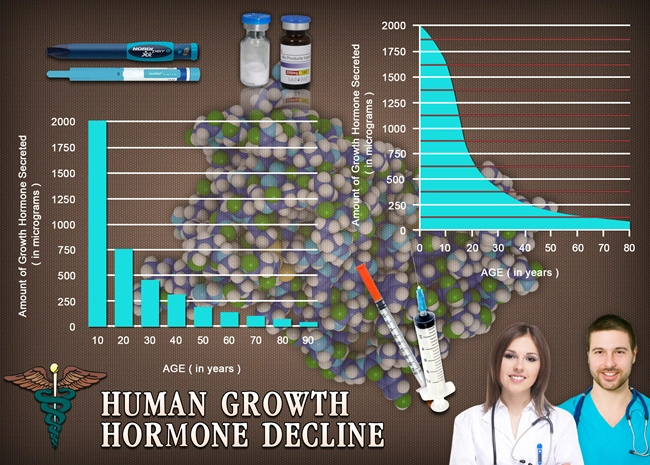
Introduction
Secondary hypogonadism, a condition characterized by the inadequate production of testosterone due to dysfunctions in the hypothalamus or pituitary gland, has been increasingly recognized as a significant health concern among American males. Recent studies have suggested a potential association between secondary hypogonadism and various hematological disorders, including anemia. This article delves into the intricate relationship between these conditions, exploring the latest research findings and their implications for clinical practice and patient care.
Understanding Secondary Hypogonadism
Secondary hypogonadism arises when the brain fails to signal the testes to produce testosterone effectively. This can result from a variety of causes, including tumors, infections, or congenital conditions affecting the hypothalamus or pituitary gland. Symptoms often include reduced libido, erectile dysfunction, fatigue, and decreased muscle mass. Diagnosis typically involves measuring serum testosterone levels along with luteinizing hormone (LH) and follicle-stimulating hormone (FSH) levels, which are usually low or inappropriately normal in secondary hypogonadism.
The Connection to Anemia and Blood Disorders
Emerging research has highlighted a potential link between secondary hypogonadism and anemia, a condition characterized by a deficiency of red blood cells or hemoglobin, which can lead to fatigue and reduced oxygen delivery to tissues. Studies have shown that men with hypogonadism may have lower hemoglobin levels, suggesting a direct impact of testosterone on erythropoiesis, the process of red blood cell production. Furthermore, testosterone therapy has been observed to increase hemoglobin and hematocrit levels, supporting the hypothesis that testosterone plays a crucial role in maintaining healthy blood parameters.
Prospective Study Findings
A recent prospective study conducted on a cohort of American males aged 30 to 70 years with diagnosed secondary hypogonadism examined the relationship between hormonal levels and hematological parameters. The study found a significant correlation between lower testosterone levels and reduced hemoglobin and hematocrit values, indicative of anemia. Additionally, participants with secondary hypogonadism were more likely to exhibit other blood disorders, such as thrombocytopenia (low platelet count) and leukopenia (low white blood cell count), compared to a control group of men with normal testosterone levels.
Clinical Implications and Management Strategies
The findings of this study underscore the importance of screening for anemia and other blood disorders in men diagnosed with secondary hypogonadism. Clinicians should consider routine hematological assessments as part of the management plan for these patients. Moreover, the potential benefits of testosterone replacement therapy (TRT) in improving hematological parameters warrant further investigation. While TRT can effectively raise testosterone levels and alleviate symptoms of hypogonadism, its impact on blood disorders requires careful monitoring to prevent complications such as polycythemia, a condition characterized by an excessive number of red blood cells.
Future Research Directions
The association between secondary hypogonadism and hematological disorders opens new avenues for research. Future studies should aim to elucidate the underlying mechanisms by which testosterone influences erythropoiesis and other blood cell production processes. Additionally, longitudinal studies are needed to assess the long-term effects of TRT on hematological health and to establish optimal treatment protocols that balance the benefits and risks of therapy.
Conclusion
The link between secondary hypogonadism, anemia, and other blood disorders represents a critical area of concern in men's health. As our understanding of these relationships deepens, it is essential for healthcare providers to integrate this knowledge into their clinical practice. By doing so, they can offer more comprehensive care to American males affected by these conditions, ultimately improving their quality of life and health outcomes.
Contact Us Today For A Free Consultation
Dear Patient,
Once you have completing the above contact form, for security purposes and confirmation, please confirm your information by calling us.
Please call now: 1-800-380-5339.
Welcoming You To Our Clinic, Professor Tom Henderson.

- Secondary Hypogonadism in American Men: Cardiovascular Risks and Management Strategies [Last Updated On: February 26th, 2025] [Originally Added On: February 26th, 2025]
- Secondary Hypogonadism: Impacts on Cognitive Function and Treatment Options in American Men [Last Updated On: March 18th, 2025] [Originally Added On: March 18th, 2025]
- Secondary Hypogonadism: Understanding Its Impact on Sleep and Health in American Men [Last Updated On: March 18th, 2025] [Originally Added On: March 18th, 2025]
- Stress-Induced Secondary Hypogonadism in American Males: Causes and Management Strategies [Last Updated On: March 18th, 2025] [Originally Added On: March 18th, 2025]
- Secondary Hypogonadism: Symptoms, Diagnosis, and Management Strategies for American Men [Last Updated On: March 18th, 2025] [Originally Added On: March 18th, 2025]
- Secondary Hypogonadism: Understanding Its Profound Psychological Impacts on American Men [Last Updated On: March 19th, 2025] [Originally Added On: March 19th, 2025]
- Genetic Insights into Secondary Hypogonadism in American Males: Diagnosis and Treatment [Last Updated On: March 19th, 2025] [Originally Added On: March 19th, 2025]
- Secondary Hypogonadism in American Males: Impact on Energy and Treatment Options [Last Updated On: March 20th, 2025] [Originally Added On: March 20th, 2025]
- Secondary Hypogonadism and Prostate Health: Impacts, Diagnosis, and Management Strategies [Last Updated On: March 21st, 2025] [Originally Added On: March 21st, 2025]
- Support Systems Crucial for Managing Secondary Hypogonadism in American Men [Last Updated On: March 21st, 2025] [Originally Added On: March 21st, 2025]
- Secondary Hypogonadism and Hair Loss: Causes, Diagnosis, and Treatment for American Males [Last Updated On: March 21st, 2025] [Originally Added On: March 21st, 2025]
- Secondary Hypogonadism: Impacts on Body Composition and Health in American Men [Last Updated On: March 22nd, 2025] [Originally Added On: March 22nd, 2025]
- Exercise Strategies for Managing Secondary Hypogonadism in American Males [Last Updated On: March 22nd, 2025] [Originally Added On: March 22nd, 2025]
- Secondary Hypogonadism in American Males: Pituitary Gland's Role and Treatment Options [Last Updated On: March 22nd, 2025] [Originally Added On: March 22nd, 2025]
- Alternative Therapies for Secondary Hypogonadism: A Comprehensive Guide for American Men [Last Updated On: March 22nd, 2025] [Originally Added On: March 22nd, 2025]
- Secondary Hypogonadism and Anemia: Understanding and Managing the Connection in American Males [Last Updated On: March 22nd, 2025] [Originally Added On: March 22nd, 2025]
- Secondary Hypogonadism's Impact on Immune Function in American Men [Last Updated On: March 23rd, 2025] [Originally Added On: March 23rd, 2025]
- Secondary Hypogonadism's Impact on Skin Health in American Men: Causes and Management [Last Updated On: March 23rd, 2025] [Originally Added On: March 23rd, 2025]
- Environmental Factors Driving Secondary Hypogonadism in American Men: A Comprehensive Analysis [Last Updated On: March 23rd, 2025] [Originally Added On: March 23rd, 2025]
- Secondary Hypogonadism: Impacts on Health and Importance of Early Detection in American Men [Last Updated On: March 24th, 2025] [Originally Added On: March 24th, 2025]
- Secondary Hypogonadism's Impact on Kidney Function: Symptoms, Diagnosis, and Management [Last Updated On: March 24th, 2025] [Originally Added On: March 24th, 2025]
- Nutrition's Role in Managing Secondary Hypogonadism in American Males [Last Updated On: March 24th, 2025] [Originally Added On: March 24th, 2025]
- Understanding Secondary Hypogonadism: Causes, Symptoms, and Treatment in American Males [Last Updated On: March 24th, 2025] [Originally Added On: March 24th, 2025]
- Secondary Hypogonadism and Mood Disorders in American Men: Links and Management Strategies [Last Updated On: March 25th, 2025] [Originally Added On: March 25th, 2025]
- Secondary Hypogonadism and Diabetes: Impact and Management in American Males [Last Updated On: March 25th, 2025] [Originally Added On: March 25th, 2025]
- Thyroid Function's Impact on Secondary Hypogonadism in American Males: Diagnosis and Management [Last Updated On: March 25th, 2025] [Originally Added On: March 25th, 2025]
- Understanding Secondary Hypogonadism: Symptoms, Diagnosis, and Management in American Males [Last Updated On: March 25th, 2025] [Originally Added On: March 25th, 2025]
- Secondary Hypogonadism: Impacts and Management Strategies for American Men's Quality of Life [Last Updated On: March 25th, 2025] [Originally Added On: March 25th, 2025]
- Managing Fatigue in American Males with Secondary Hypogonadism: Causes and Strategies [Last Updated On: March 26th, 2025] [Originally Added On: March 26th, 2025]
- Understanding and Managing Secondary Hypogonadism in American Males: Symptoms, Causes, and Treatments [Last Updated On: March 26th, 2025] [Originally Added On: March 26th, 2025]
- Secondary Hypogonadism in American Males: Lifestyle Factors and Medical Interventions [Last Updated On: March 26th, 2025] [Originally Added On: March 26th, 2025]
- Secondary Hypogonadism: Impact on Libido and Treatment Options for American Males [Last Updated On: March 26th, 2025] [Originally Added On: March 26th, 2025]
- Secondary Hypogonadism and Liver Health: A Critical Connection for American Males [Last Updated On: March 26th, 2025] [Originally Added On: March 26th, 2025]
- Secondary Hypogonadism: Causes, Diagnosis, and Management for American Males [Last Updated On: March 26th, 2025] [Originally Added On: March 26th, 2025]
- Secondary Hypogonadism's Impact on Fat Distribution in American Men [Last Updated On: March 26th, 2025] [Originally Added On: March 26th, 2025]
- Managing Secondary Hypogonadism: Stress, Nutrition, and Holistic Approaches for American Males [Last Updated On: March 26th, 2025] [Originally Added On: March 26th, 2025]
- Exercise as a Key Strategy in Managing Secondary Hypogonadism in American Men [Last Updated On: March 27th, 2025] [Originally Added On: March 27th, 2025]
- Secondary Hypogonadism's Impact on Physical Performance in American Men [Last Updated On: March 27th, 2025] [Originally Added On: March 27th, 2025]
- Secondary Hypogonadism: Understanding Causes, Impacts, and Management in American Men [Last Updated On: March 27th, 2025] [Originally Added On: March 27th, 2025]
- Secondary Hypogonadism: Impact on Emotional Health in American Men [Last Updated On: March 27th, 2025] [Originally Added On: March 27th, 2025]
- Sleep Disorders and Secondary Hypogonadism: Mechanisms, Evidence, and Treatment Implications in American Men [Last Updated On: March 27th, 2025] [Originally Added On: March 27th, 2025]
- Secondary Hypogonadism: Impact on Muscle Strength and Treatment in American Men [Last Updated On: March 27th, 2025] [Originally Added On: March 27th, 2025]
- Secondary Hypogonadism's Psychological Impact on American Men: A Comprehensive Overview [Last Updated On: March 27th, 2025] [Originally Added On: March 27th, 2025]
- Secondary Hypogonadism's Impact on Bone Density in American Men: Causes and Management [Last Updated On: March 28th, 2025] [Originally Added On: March 28th, 2025]
- Secondary Hypogonadism and Autoimmune Diseases: Insights and Management in American Men [Last Updated On: March 28th, 2025] [Originally Added On: March 28th, 2025]
- Secondary Hypogonadism: Impacts on American Men's Social Life and Health [Last Updated On: March 28th, 2025] [Originally Added On: March 28th, 2025]
- Secondary Hypogonadism and Cardiovascular Health: Risks and Management Strategies for American Males [Last Updated On: March 28th, 2025] [Originally Added On: March 28th, 2025]
- Secondary Hypogonadism's Impact on Mental Health in American Males: A Comprehensive Overview [Last Updated On: March 28th, 2025] [Originally Added On: March 28th, 2025]
- Secondary Hypogonadism's Impact on Mood in American Men: Causes, Effects, and Management [Last Updated On: March 28th, 2025] [Originally Added On: March 28th, 2025]
- Secondary Hypogonadism: Symptoms, Causes, and Treatment for American Males [Last Updated On: March 28th, 2025] [Originally Added On: March 28th, 2025]
- Secondary Hypogonadism in American Males: Causes, Monitoring, and Management Strategies [Last Updated On: March 30th, 2025] [Originally Added On: March 30th, 2025]
- Secondary Hypogonadism's Impact on Cognitive Function in American Men [Last Updated On: March 30th, 2025] [Originally Added On: March 30th, 2025]
- Understanding Secondary Hypogonadism: Symptoms, Diagnosis, and Hormonal Therapies for American Males [Last Updated On: March 31st, 2025] [Originally Added On: March 31st, 2025]
- Secondary Hypogonadism: Impact on Energy, Vitality, and American Men's Health [Last Updated On: April 2nd, 2025] [Originally Added On: April 2nd, 2025]
- Managing Secondary Hypogonadism: The Role of Diet in Hormonal Health [Last Updated On: April 3rd, 2025] [Originally Added On: April 3rd, 2025]
- Secondary Hypogonadism: Impact on Weight and Management Strategies for American Males [Last Updated On: April 4th, 2025] [Originally Added On: April 4th, 2025]
- Understanding Secondary Hypogonadism: Causes, Symptoms, and Management for American Males [Last Updated On: April 6th, 2025] [Originally Added On: April 6th, 2025]
- Secondary Hypogonadism: Impacts on Men's Health and Relationships in America [Last Updated On: April 7th, 2025] [Originally Added On: April 7th, 2025]
- Sleep's Impact on Secondary Hypogonadism in American Males: A Comprehensive Overview [Last Updated On: April 8th, 2025] [Originally Added On: April 8th, 2025]
- Secondary Hypogonadism's Impact on Emotional Resilience in American Men [Last Updated On: April 8th, 2025] [Originally Added On: April 8th, 2025]
- Community Support Enhances Management of Secondary Hypogonadism in American Men [Last Updated On: April 9th, 2025] [Originally Added On: April 9th, 2025]
- Secondary Hypogonadism in American Males: Holistic Treatment and Management Strategies [Last Updated On: April 9th, 2025] [Originally Added On: April 9th, 2025]
- Secondary Hypogonadism's Impact on Cognitive Function in American Men [Last Updated On: April 10th, 2025] [Originally Added On: April 10th, 2025]
- Secondary Hypogonadism: Impacts and Management for American Men's Daily Life [Last Updated On: April 10th, 2025] [Originally Added On: April 10th, 2025]
- Understanding Secondary Hypogonadism: Symptoms, Causes, and Treatment in American Males [Last Updated On: April 11th, 2025] [Originally Added On: April 11th, 2025]
- Secondary Hypogonadism in American Males: Causes, Symptoms, and Personalized Treatment [Last Updated On: April 12th, 2025] [Originally Added On: April 12th, 2025]
- Secondary Hypogonadism: Impacts on Mental Health and Holistic Management Strategies [Last Updated On: April 12th, 2025] [Originally Added On: April 12th, 2025]
- Managing Secondary Hypogonadism in American Men: A Comprehensive Approach [Last Updated On: April 13th, 2025] [Originally Added On: April 13th, 2025]
- Managing Secondary Hypogonadism: Symptoms, Causes, and Treatment in American Males [Last Updated On: April 15th, 2025] [Originally Added On: April 15th, 2025]
- Secondary Hypogonadism: Emotional Impacts and Comprehensive Management Strategies [Last Updated On: April 16th, 2025] [Originally Added On: April 16th, 2025]
- Managing Secondary Hypogonadism: Importance of Regular Health Check-ups for American Males [Last Updated On: April 16th, 2025] [Originally Added On: April 16th, 2025]
- Secondary Hypogonadism: Impacts on Men's Vitality and Management Strategies [Last Updated On: April 16th, 2025] [Originally Added On: April 16th, 2025]
- Understanding Secondary Hypogonadism: Causes, Symptoms, and Management for American Males [Last Updated On: April 17th, 2025] [Originally Added On: April 17th, 2025]
- Secondary Hypogonadism in American Males: Lifestyle Impact and Management Strategies [Last Updated On: April 17th, 2025] [Originally Added On: April 17th, 2025]
- Secondary Hypogonadism: Symptoms, Causes, and Management in American Males [Last Updated On: April 17th, 2025] [Originally Added On: April 17th, 2025]
- Nutrition's Role in Managing Secondary Hypogonadism: Boosting Testosterone Naturally [Last Updated On: April 19th, 2025] [Originally Added On: April 19th, 2025]
- Secondary Hypogonadism: Impacts on Muscle, Bone, and Cardiovascular Health in American Men [Last Updated On: April 19th, 2025] [Originally Added On: April 19th, 2025]
- Secondary Hypogonadism: Impact on Self-Esteem and Treatment Options for American Men [Last Updated On: April 20th, 2025] [Originally Added On: April 20th, 2025]
- Understanding Secondary Hypogonadism: Causes, Impacts, and Management in American Males [Last Updated On: April 21st, 2025] [Originally Added On: April 21st, 2025]
- Secondary Hypogonadism in American Men: Symptoms, Diagnosis, and Management Strategies [Last Updated On: April 21st, 2025] [Originally Added On: April 21st, 2025]








